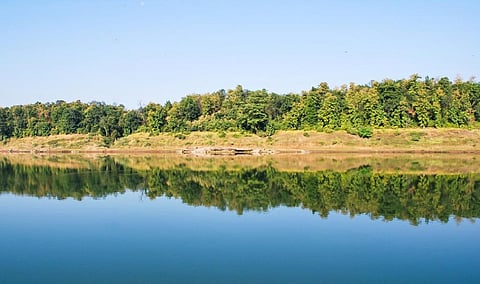

Activists have expressed disbelief at Union Finance Minister, Nirmala Sitharaman’s sanctioning money for the Ken-Betwa and other river interlinking projects across India in the Union Budget for 2022-2023 February 1, 2022.
They said the projects did not have statutory clearances, were sub judice and had hardly progressed in the last two decades. Sitharaman allocating money to these projects was just an election sop, the experts said.
Sitharaman had announced that “the implementation of the Ken-Betwa Link Project, at an estimated cost of Rs 44,605 crore, will be taken up. This is aimed at providing irrigation benefits to 0.9 million hectares of farmers’ lands, drinking water supply for 6.2 million people, 103 MW of hydroelectric and 27 MW of solar power.”
Allocations of Rs 4,300 crore in Revised Estimates 2021-22 and Rs 1,400 crore in 2022-23 have been made for the project, Sitharaman said.
Read
“The Ken-Betwa announcements, which started in March last year, are based on elections in Uttar Pradesh. That is a project on which they do not even have statutory clearances. There are also legal challenges pending. So all these provisions are meaningless,” Himanshu Thakkar from the South Asia Network on Dams, Rivers and People, told Down To Earth magazine.
He added that work on the project could not start unless legal challenges and statutory clearances were over. “And if you cannot start work, you cannot spend money. So all this is for elections,” Thakkar said.
The Ken-Betwa River Interlinking (KBRIL) Project aims to transfer surplus water from the Ken to the Betwa to irrigate the drought-prone Bundelkhand region. Both, the Ken and Betwa are the tributaries of the Yamuna.
DTE had reported December 28, 2021 that the project would submerge a major portion of the core area of the Panna Tiger Reserve in Madhya Pradesh, according to a study published in the Current Science journal.
The project will also lead to the loss of two million trees, The inter-linking of rivers and biodiversity conservation: a study of Panna Tiger Reserve, Madhya Pradesh, India warned.
“Polls are a primary driver. As far as Ken-Betwa is concerned, I really fail to understand how they can go ahead without a clearance from the Supreme Court? How can you go ahead in any project that is sub judice?” Manoj Misra of Yamuna Jiye Abhiyan told Down To Earth.
Sitharaman also stated that draft detailed project reports of five river links have been finalised, namely:
“Only the draft DPRs have been finalised. Work can proceed only when consensus is arrived at. And there has not been any consensus for 40 years. There is no surplus water in either the Godavari or the Mahanadi. If that is the case, there will be no water for either the Krishna-Pennar or Pennar-Cauvery,” Thakkar said.
He added that the Damanganga-Pinjal and Par-Tapi-Narmada had been part of the priority river links since 2003-04.
“These were among the top five links during the Vajpayee regime. Two decades later, there is no progress on them. And there is no consensus between Gujarat and Maharashtra on those two. Neither of them want to give water to another state. Instead, they want to take water. So it is a non-starter,” Thakkar noted.
It was also under late Prime Minister Atal Bihari Vajpayee that the idea to link the Ken and Betwa rivers had been approved.
Misra said it was a very serious issue because there were several questions regarding the Ken-Betwa project that remain unanswered. The most important was of course the clearance given by the National Board for Wildlife being illegal.
“It did not have the authority to give the clearance. That is what has been challenged before the Supreme Court. The SC Central Empowered Committee has already acceded to this viewpoint that the clearance by the NBWL is illegal. How can any state, leave the Centre, think of implementing something like this?” he asked.